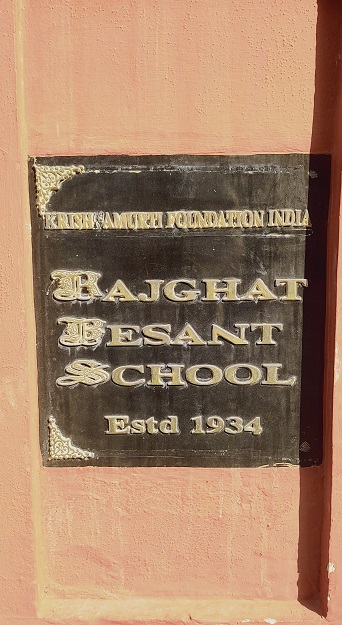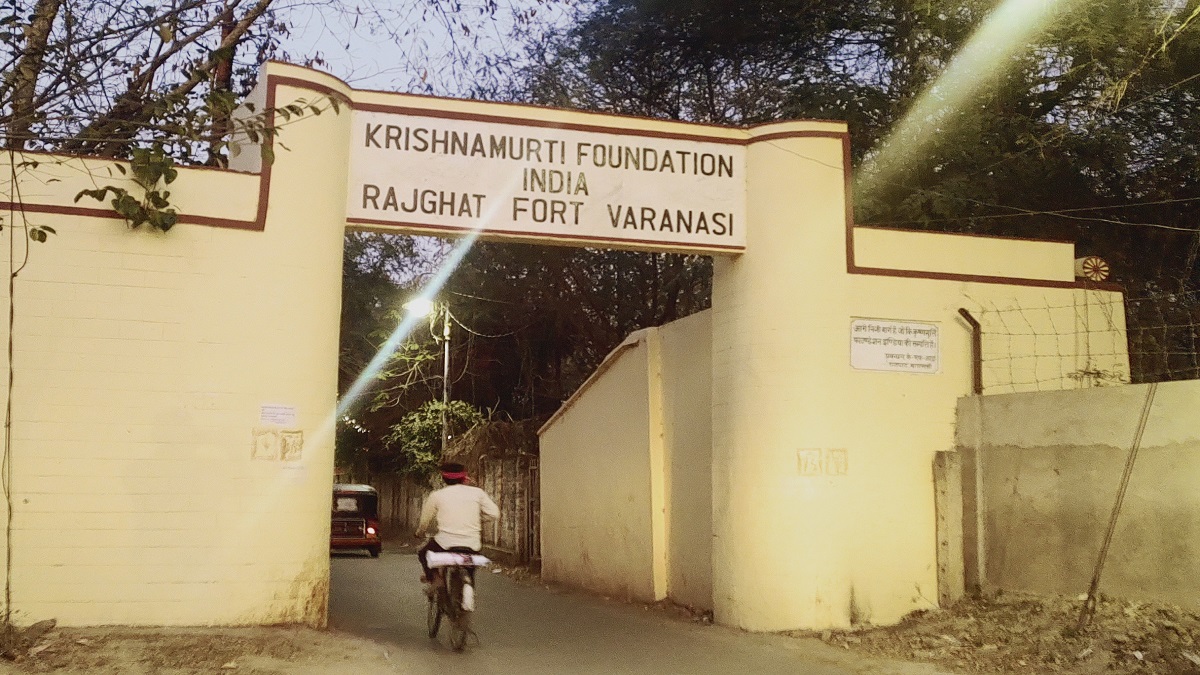Rajghat Besant School, named after Dr Annie Besant located in Varanasi is the second oldest school of Krishnamurti Foundation India and one of the oldest resident-cum-day schools of India, established in 1934.
Varanasi, a city which has a history of being an educational and musical centre, with iconic institutions like Banaras Hindu University (BHU), Indian Institute of Technology and Mahatma Gandhi Kashi Vidyapith, also has one of the oldest schools in the country called ‘Rajghat Besant School (RBS)’. The school is about to complete 100 years of its existence and has produced notable alumni who are in prominent positions in various fields.
Rajghat Besant School in Varanasi is the second oldest school of Krishnamurti Foundation India and one of the oldest resident-cum-day schools of India, established in 1934 by Jiddu Krishnamurti. It is named after Dr Annie Besant and is located near the Kashi Railway Station on the banks of the river Ganges. RBS is a residential, co-educational, English medium school affiliated with the CBSE Board.
The school is spread over 300 acres stretching across both banks of the Varuna. The school has around 250 students from classes III through class XII, of which about 230 are boarders. The class strength is no more than 25 students per class and the teacher-student ratio is about 1:6. While over 20 states of India are represented at the school, the majority of the students hail from Uttar Pradesh, Bihar, Madhya Pradesh and Jharkhand. The school has a healthy gender ratio of about 50%.
Genesis of RBS
Rajghat Besant School (RBS) is one of the six schools of Krishnamurti Foundation India. The oldest among these are Rishi Valley in Andhra (about 95 years old) and RBS in Varanasi (about 90 years old). Under the direction of Krishnamurti, the school was set up by Benegal Sanjiva Rao, a theosophist.
Rajghat School is known for its joyful and stress-free environment of education.
Vijay Anand, a retired Indian Navy official and currently a teacher at RBS, talking about the school said: “330 acres of land was procured by Krishnamurti, around 1929, who was then associated with Theosophical Society led by Annie Besant. The intent was to establish educational institutions with a global outlook and international students that eventually led to the founding of Rajghat Besant School.”
Learning that is not borne out of comparison’
Inspired by Krishnamurti’s vision, the school strives to create a learning environment that is free of comparison and where each student is encouraged to excel to the best of his ability. With this in mind, children are exposed to a wide variety of areas at a young age in the field of academics, sports and arts. Urshia Akhtar, Principal, of Rajghat Besant School, said that the pedagogical processes and non-academic endeavours at the school weave in this spirit of non-comparison in everyday practice.
Nurturing the body is an essential feature of the approach at the school. Students are required to play a wide variety of active sports wherein the emphasis remains on team play.
Kumar Radhakrishnan, Director of the School talked about the journey of the school over the decades from the time of its founding. He said that the school was built on Krishnamurti’s vision to set human beings “unconditionally free”- to be free from any conditioning either from outside or from within. This, Krishnamurti said, is necessary for a child to see things as they are without judgement and hence pursue what he called right action.
He also said that all KFI schools including RBS are committed to the community living nearby through outreach activities. In the case of RBS, a community school for children in the villages around the campus and a women empowerment unit have been functioning for decades.
Admission Process and Fee structure
The admission process which consists of tests of language and numeracy skills followed by an interview of the parents and the child attempts to gauge the parents' intent for putting the child in RBS and the child’s suitability to live in such an environment.
The fee structure is as per the regulations of the Uttar Pradesh government. Currently, the annual recurring fees for primary classes is about Rs. 4.50 lakhs while for Class XII students it is about Rs. 5 lakhs. The day scholars' fee is around Rs. 2 lakhs.
The philosophy behind
In the words of J. Krishnamurti: “A school is a place where one learns about the totality, the wholeness of life. Academic excellence is absolutely necessary, but a school includes much more than that. It is a place where both the teacher and the student explore, not only the outer world, the world of knowledge but also their own thinking, their own behaviour."
Intent
The intention behind the school in the words of J Krishnamurti is “the cultivation of the totality of the mind and not merely the giving of information. In the total development of the human being through the right education, the quality of love must be nourished and sustained from the very beginning….The man of right education, he is considerate to all, including the animals and plants, and this is reflected in his behaviour and manner of talking."
“We are concerned not only with the cultivation of the mind and the awakening of emotional sensitivity but also with a well-rounded development of the physique. For, if the body is not healthy, vital, it will inevitably distort thought and make for insensitivity - the right kind of food and sufficient sleep are of great value."
Siddhartha Menon, Secretary of Rajghat Education Centre, who has been working in various capacities in Krishnamurti schools for about 30 years said: “These schools not just teach you but shape your personality. Personally, I have been associated with the Krishnamurti schools for a long time including being a student of one of these schools.”
Unique Pedagogy
Learning in Junior School is mainly through activities, especially arts and crafts that nurture creative development. Activities like storytelling, plays and assembly presentations inculcate skill sets in children that are crucial for academic excellence. The school believes in integrating the requirements into the curriculum to combine opportunities for creative expression with academic rigour. At the level of Senior School (Classes IX-XII), children are accorded higher levels of responsibility with the curriculum reflecting the onset of qualifying exams.
Reflecting the higher academic demands, senior students spend an hour and a half in prep classes supervised by a teacher. The choices available for pursuing senior secondary are discussed from the beginning of class X. Students seeking admission to Class XI can choose from Science, Commerce or Humanities groups, and a wide variety of subject options including Psychology, Computer Science, Economics, Physical Education and Fine Arts. They are also provided with career guidance and internet access to explore college-level educational opportunities as well as professional coaching.
In summary, what is being attempted at Rajghat Besant School is to endow students with the ability to think for themselves and excel in whatever they choose to pursue. As much as it is necessary for the uncertain era we live in, such an educational endeavour can only succeed at the hands of committed teachers and parents who have a common understanding of the educational vision of Shri J. Krishnamurti.
Achyut Patwardan School- The School for underprivileged
On a Saturday weekend students were holding activities, in one such activity before Holi, a group of students were reading the Preamble of the constitution. Another group was preparing for a group song and so on. These are students who belong to underprivileged communities living in villages located around the school.
Born out of his deep compassion for the underprivileged, Krishnamurti invited his friend and socialist Achyut Patwardan to engage with the impoverished villages in and around Rajghat. Thus was born Achyut Patwardan School (APS) which has been providing educational opportunities to the needy community for over 60 years, one of the oldest such schools in the country. The school is recognized by the UP Board up to class 8 and is now seeking the same for up to class 10.
NimeshVed, Principal of APS says, in 1953, Achyut Patwardhan, a close associate of J. Krishnamurti, and a friend of Mahatma Gandhi further expanded the area adjoining the school and founded the Rajghat Rural Centre, which houses two rural schools - one for boys, and the other for girls, in the Village Sarai Mohana; it also has a hospital, a vocational training institute for women and a farm, which offers its services free of cost, all run by the Krishnamurti Foundation India.
APS currently has about 250 children from nursery to class VIII. The gender mix is maintained at close to 50%. The children mostly come from the surrounding villages of Sarai Mohana, Kotwa, Kapildhara and Rajapur.
Read More:
Follow Shiksha.com for latest education news in detail on Exam Results, Dates, Admit Cards, & Schedules, Colleges & Universities news related to Admissions & Courses, Board exams, Scholarships, Careers, Education Events, New education policies & Regulations.
To get in touch with Shiksha news team, please write to us at news@shiksha.com

Abhay an alumnus of IIMC and Delhi University, has over a decade long experience of reporting on various beats of journalism. During his free time he prefers listening to music or play indoor and outdoor games.
Latest News
Next Story



